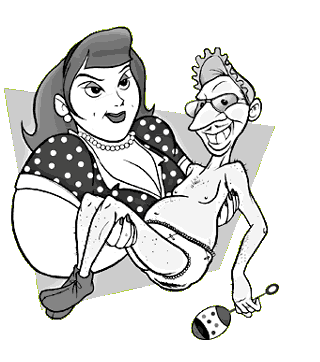
It's not uncommon for those of us advancing in age to wish we were a little bit younger than we are. Others among us would like to be a lot younger. At least for an evening.
I'm referring to a type of sexual play called "infantilism." This is a kind of role-playing, engaged in by adults, in which one partner pretends to be a baby. It can involve dressing up in adult-sized baby clothes, including bonnets, booties, and -- you guessed it -- diapers. Usually a second partner will pretend to be a mother, father, baby-sitter, or other caretaker, but practitioners of infantilism sometimes play as two children or two babies together.
"We're not talking about anything involving actual children here," says Mary, a female S/M practitioner who enjoys role-playing as both a baby and as a mommy. "Under no circumstances does this kind of play include anyone who is not a consenting adult. But for adults, pretending to be a baby or a young child can be incredibly healing."
While infantilism is not a practice that most of the world knows about, there is definitely an underground devoted to it. A San Francisco-area organization called the Diaper Pail Friends puts members in touch with mail-order services that sell adult baby clothes, adult diapers, and other paraphernalia.
While it might seem mind-bendingly kinky to many of us, even to those of us with unusual tastes, infantilism doesn't always include sexual play. "In fact," Mary elaborates, "many scenes involving this kind of role play include nothing more physically intimate than playing and talking in baby talk." Other times, the scene may involve the changing of diapers after the adult baby in question has done a "Number 1" or a "Number 2."
"The sensations of being in diapers -- of being freed from toilet training, one of every human's earliest traumas -- can feel incredibly nurturing. So can the physical sensations of being wiped clean, powdered, and pinned into a fresh, clean diaper, an experience most of us don't have as adults." Other times, the play does turn sexual -- but not as often as, nor in ways, you might expect.
Sandy had numerous fantasies about being sexual while pretending to be a baby. She decided to act out those fantasies with her longtime partner and found herself unexpectedly reacting with terror and distress.
"Adults who are going back to their childhood and pretending to be babies can become profoundly innocent," says Sandy. "I experienced a lot of emotional pain and fear by going too far."
Other infantilism practitioners do enjoy being sexual while pretending to be young. But being sexual while in an imagined childhood is usually very different from being sexual as a real-life adult.
"Some of our adult fantasies of childhood are very different from the way it really feels to be young and helpless," says Mary. "You'd be surprised at how liberating that can be, both sexually and otherwise -- but when you're accessing your inner child by pretending to be young, you're going to experience a much more primal level of sensuality, so again, you have to be cautious. The slightest touch can be intensely sensual, but the wrong stimulus can make you react with rage and tears. A little goes a long way. But that's true in all aspects of infantilism, not just the sexual."
Mary laughs. "In other words, adults pretending to be babies get to be just as precocious as real babies! That's the beauty of it!"
Thomas S. Roche is a GettingIt staff writer and the nonfiction editor at Gothic.Net
